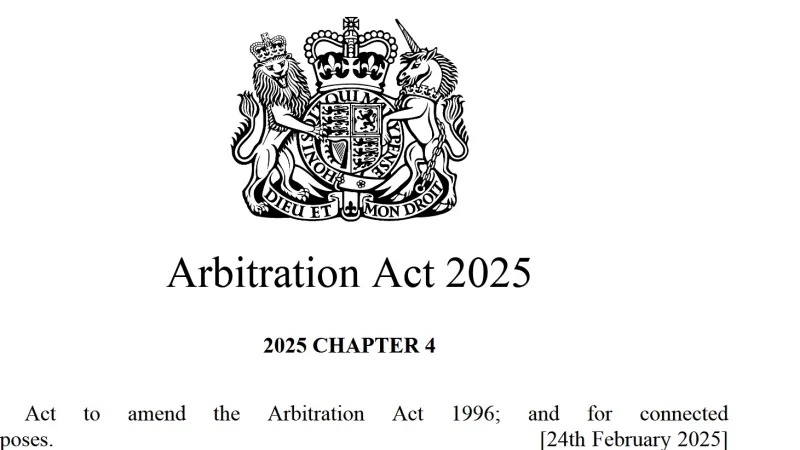The English Arbitration Act 2025: Enhancing Trust, Efficiency, and Global Appeal
August 5, 2025
Change is in the air: The English Arbitration Act 2025 (the "2025 Act") is a significant and timely piece of legislation, which, in the words of the UK Ministry of Justice, will "turbocharge UK's position as the world-leader in arbitration." The Act received Royal Assent on 24 February 2025, and will come into force on 1 August 2025.
Various articles have discussed the changes and the pros and cons of the 2025 Act (see, e.g., here). Below, we focus on the 2025 Act as a recalibration of the delicate balance between arbitral autonomy and judicial oversight, with the 2025 Act refining the judiciary’s role, not as a passive enforcer, nor as an intrusive supervisor, but as a principled partner in the arbitral process.
Overview of the 2025 Act
The 2025 Act comprises 18 Sections that finesse certain aspects of the 1996 Arbitration Act (the "1996 Act").
The 1996 Act has been able to function effectively for nearly three decades, underpinning England as a leading seat of arbitration worldwide with London consistently ranking among the most popular arbitral seats (see, e.g., the recent 2025 Queen University of London International Arbitration Survey in partnership with White & Case “The Path Forward: Realities and Opportunities in Arbitration” with London being ranked as the most popular seat at 43%, followed by Singapore and Hong Kong each at 31%).
As mentioned in the UK's Law Commission Final Report on the 1996 Act (the "Commission's Report"), there was a consensus that a targeted but not "root and branch" reform was necessary to maintain London's global competitiveness as a leading arbitral seat (Commission's Report, paragraph 1.22). This included improving procedural clarity and addressing uncertainties. The 2025 Act addresses these challenges, reaffirming England's commitment to offering a world-class arbitral environment. Below is a brief overview of the six main areas that the 2025 Act reforms.
Summary Disposal
Section 7 of the 2025 Act introduces a new Section 39A to the 1996 Act which codifies the tribunal's power to make an award on a summary basis. This allows tribunals to dispose of issues summarily where there is no "real prospect of succeeding on the claim or issue, or [. . .] in the defence of the claim of issue" (see also Commission's Report, paragraphs 6.45 et seqq including at paragraph 6.47: "we think it defensible that the [2025] Act, which would be applied by domestic courts, adopts a threshold carefully developed in domestic law. Thus we prefer the threshold 'no real prospect of success.”').
While many institutional rules, including the LCIA Arbitration Rules 2020 (see Article 22.1(viii)), already include provisions for an early determination procedure, not having the summary disposal power expressly codified in the 1996 Act created fertile ground for "due process paranoia" which discouraged arbitrators from using it. This is expected as tribunals are naturally cautious of giving any party a basis for complaining that it has not been given a reasonable opportunity to present its case (either for fear of challenge to an award or resistance to enforcement under the New York Convention or both).
Further, the LCIA has indicated that "while Early Determination [under Article 22.1(viii) of the LCIA Rules] can result in significant time and cost savings, the threshold standard remains high" (see also here).
Codifying the tribunal's power to make an award on a summary basis will encourage tribunals to actually use it and will improve efficiency, increase speed, and reduce costs. Notably, this power can only be used with appropriate procedural safeguards, including ensuring that all parties are given a reasonable opportunity to present their case and that, before making an award on a summary basis, a tribunal must already have exercised its power under section 34(1) (i.e., to decide all procedural and evidential matters) (section 39A(2) of the 2025 Act). In the case of an ad hoc arbitration, the parties may wish to include such summary disposal provisions in the rules, albeit they can rely on statutory power if required.
Law Governing the Arbitration Agreement
A further welcomed (and hotly debated) reform addresses the question of the law governing the arbitration agreement. Previously, the question of the governing law of an arbitration agreement (where there is no express choice of governing law by the parties to a contract) was considered and determined in the landmark judgment of the UK Supreme Court in Enka v Chubb in which the UK Supreme Court summarised the main principles and laid out the test for determining the proper law of the arbitration agreement (for previous coverage, see, e.g., here). This complex test has now been replaced with a more straightforward rule: where the parties have not expressly agreed the governing law of an arbitration agreement, the law of the seat now shall apply by default (Section 1(2)(1) of the 2025 Act amending Section 6 of the 1996 Act). Notably, this new rule does not apply to investment treaty arbitration or "legislation [. . .] outside the United Kingdom" (Section 1(2)(3) of the Act amending Section 6 of the 1996 Act). This change warrants clarity, simplicity and, most importantly, certainty which contractual parties need.
Arbitrator’s Duty of Disclosure
The other major reform is the codification of the arbitrator’s duty of disclosure. This duty, previously defined primarily through case law (including in the UK Supreme Court decision of Halliburton v Chubb) is now codified in new Section 23A to the 1996 Act (see Section 2(2) of the Act). Arbitrators must disclose any circumstances that might give rise to justifiable doubts about their impartiality. Furthermore, it is based on what the arbitrator knows or ought reasonably to know. This is a continuous and mandatory duty, meaning that the parties cannot contract out of it. This reform is especially relevant in light of growing concerns about transparency and conflicts of interest in international arbitration—see, for example, the updated 2024 IBA Conflicts of Interest Guidelines which broaden and detail further an arbitrator's disclosure duties as regards the parties and beyond, including litigation funders, insurers, and relationships with States and State-owned entities (in particular and by way example, IBA General Standard 6: "Relationships").
By codifying the arbitrator's duty of disclosure, the 2025 Act strengthens confidence in the impartiality and transparency of arbitral proceedings. It also clarifies this duty upfront, aiming to avoid lengthy and costly litigation on this issue or requiring arbitrators and parties to dissect case law to determine the same.
Arbitrator Immunity
The 2025 Act also addresses the issue of arbitrator immunity at new Sections 24(5A), 25, 28, 29(1) and 64 (see Sections 3–4 of the 2025 Act). While the 1996 Act provided limited immunity, the new provisions go further, especially in cases involving arbitrator's resignation or removal. An arbitrator who resigns is now protected from liability unless the resignation is "unreasonable" (new Section 29(4) to the 1996 Act). Similarly, in court applications seeking the removal of an arbitrator, arbitrators cannot be made liable for the costs of the proceedings unless they have acted in "bad faith" (new Section 24(5A) to the 1996 Act). These changes are essential for encouraging arbitrators to act without fear of potential exposure to costs liability (see, e.g., 2023 UK Law Commission "Review of the Arbitration Act 1996", Chapter 5: "Arbitrator Immunity"). This contrasts with egregious examples of an arbitrator being stripped of their immunity, for example being sentenced in absentia in Qatar for alleged crimes for issuing an award against a prominent Qatari businessman, or where arbitrators were incarcerated in Peru for having determined their fees based on the amount in dispute and convening procedural hearings with the parties.
The 2025 Act strengthens the independence and impartiality of arbitrators encouraging robust decision-making.
Jurisdictional Challenges
One of the most debated reforms in the lead-up to the 2025 Act’s passage concerned jurisdictional challenges. Under Section 67 of the 1996 Act, parties could seek a full rehearing by the courts even after the tribunal had ruled on its jurisdiction under the Kompetenz-Kompetenz principle. This often led to duplication of proceedings, higher costs, and delays. The 2025 Act introduces a more streamlined approach in Sections 10 and 11 (amending Section 67 of the 1996 Act). A full rehearing is now available only in limited circumstances, namely if the challenging party did not participate in the arbitration or "did not know and could not with reasonable diligence have discovered the ground" to challenge jurisdiction (Section 11(3C) of the Act). Subject to these limited exceptions, the courts will adopt an appeal-style review, giving real weight to the tribunal’s decision.
This is a significant development from the current position under the UK Supreme Court's decision in Dallah Real Estate & Tourism Holding Co v Ministry of Religious Affairs of the Government of Pakistan [2010] UKSC 46, in which the Supreme Court said that any challenge before the court under section 67 is potentially by way of a full hearing, even if there was already a full hearing before the tribunal (Dallah at [26], [96], [159–60]; see also Commission's Report at paragraphs 9.12 et seqq; see also here).
Moreover, any ruling by the tribunal was said to be of no legal or evidential value (Dallah, paragraph 30). The 2025 Act seeks to restore the balance: a challenge before the court is allowed, but there are limits to the arguments and evidence which can be presented. As noted in the Commission's Report, "if a tribunal is empowered to rule on its jurisdiction, and rule first before a court does, that ruling should have some weight" and "the court should consider the tribunal's award—whereas the current position if that the court may consider the award" (paragraphs 9.56 and 9.65).
Powers of Emergency Arbitrators
The 2025 Act clarifies and expands the powers of emergency arbitrators (Section 8 of the Act amending Section 41 of the 1996 Act). Emergency arbitrators can now issue peremptory orders enforceable by the courts and may authorise applications for urgent court relief. As interim and emergency measures become more critical in fast-moving international disputes, this change will make London-seated arbitrations more dynamic, effective, and enforceable in urgent scenarios. Again, the 2025 Act aims to give greater weight, relevance, and support to arbitration over the role of the domestic courts.
Conclusion
The reforms to the 1996 Act reflect broader themes. The 2025 Act refines and codifies best practices into a coherent legislative framework. These refinements illustrate a commitment to arbitration that is both procedurally efficient and substantively fair. They also reinforce the principle of limited judicial intervention in arbitration, while ensuring that the fundamentals, like impartiality and due process, remain protected.
You may also like










